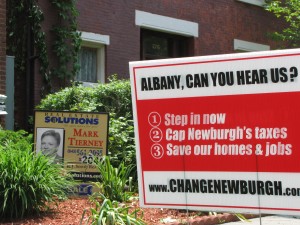
If Newburgh is broke and battered and its finances are in tatters, as many believe, silence is not an option anymore. The business community appears ready for a major change.
Nearly 20 business persons, representing more than 2,000 employees who work within the city limits, said recently it is time to bring some momentum to mitigate the challenges Newburgh faces.
With St. Luke”™s-Cornwall Hospital”™s Newburgh campus the largest employer in the eastern section of Orange County, President and CEO Allan Atzrott, who led the discussion group, said it was time Albany intervened so the city, which some residents are asking be put in receivership, can bypass its Common Council, “which has been ineffective and dysfunctional in the 11 years I”™ve been at St. Luke”™s.”
Fred Visconti, owner of Visconti Limousines; Kathy Kenny, vice president of finance for Mt. St. Mary College; Kathy Benz, Key Bank”™s mortgage director for the Hudson Valley; David Potack, vice president of Unitex; Realtor John J. Lease and others with a vested stake in a safer city with more rateables gathered around the table at The Pizza Shop in the West Shore Gallery to say with one voice, “Enough is enough.”
Realizing the nation as a whole is facing a financial crisis, business owners were nevertheless astounded ”“ and disgruntled ”“ by the fact that Newburgh has failed to produce an audit in 2010 or 2011 and has a bond payment it can”™t pay. “In three years,” Atzrott said, “Newburgh has had a 300 percent increase in taxes and a 20 percent cut in city employees that provide needed services, and seven city managers in the past decade.”
The group of Newburgh stakeholders has formed the Greater Newburgh Partnership and said state Sen. William Larkin and Assemblyman Tom Kirwan, who both represent the city, were crafting legislation in Albany to bypass the mayor and Common Council and bring a team of knowledgeable leadership to the helm of the city to navigate it out of the financial and physical condition into which it has sunk.
Everett Smith, who publishes the local paper, The Sentinel, suggested Newburgh become more tourist friendly, closing Broadway for street fairs and bringing the city”™s farmer”™s market into the downtown area. “It”™s a way to promote Newburgh,” said Smith.
Atzrott said, “What we need are cops, codes and cleanliness. We need community watch groups. We need a city that is safe and accommodating. If we replace city government, we will replace the status quo.”
The business leaders lamented the city”™s crumbling housing stock ”“ either it  needs to be demolished or rehabilitated, if possible, with the local building trades offering to pitch in to do renovations, they said.  “We have people here who just stopped paying their taxes and mortgages, wait nearly 18 months before they have to get out, and then walk away,” said Rick Milton of Mesh Realty. “This situation has gone beyond the homeowners”™ ability to stay in their homes.”
They said the city needs to free up the ability for business to cut through red tape and to actively pursue absentee landlords to keep buildings up to code.
“There”™s talk of a charter change,” said Atzrott. Pattern for Progress is looking into the process. “We hope Jonathan Drapkin is successful in his research. The Common Council needs to be circumvented. That”™s my sense of it. We can”™t wait for a charter change. Â Â Look at what Beacon has done. It has a Democratic mayor and a Republican council. But they have made their city a destination. The current government here has been dysfunctional for years ”“ the time is now to change it.”
Giovanni Palladino, architect and local planner, works with Leyland Alliance, whose plans to renovate 30 acres of the city”™s waterfront property came to a standstill when the recession hit.
As a lifelong resident, Palladino is sad to see what”™s become of the city he was born in. “The West End is mostly residential with an aging population, and the East End is mostly subsidized housing,” he said. “Seventy percent of the city”™s residents are renting, and 30 percent of that number is subsidized. It”™s not just the city; it”™s the county, too. When they need housing, they put people in Newburgh, and we are left to deal with the problems.”



















